Charles E W Bean, Diaries, AWM38 3DRL 606/252/1 - 1918 - 1935 - Part 3
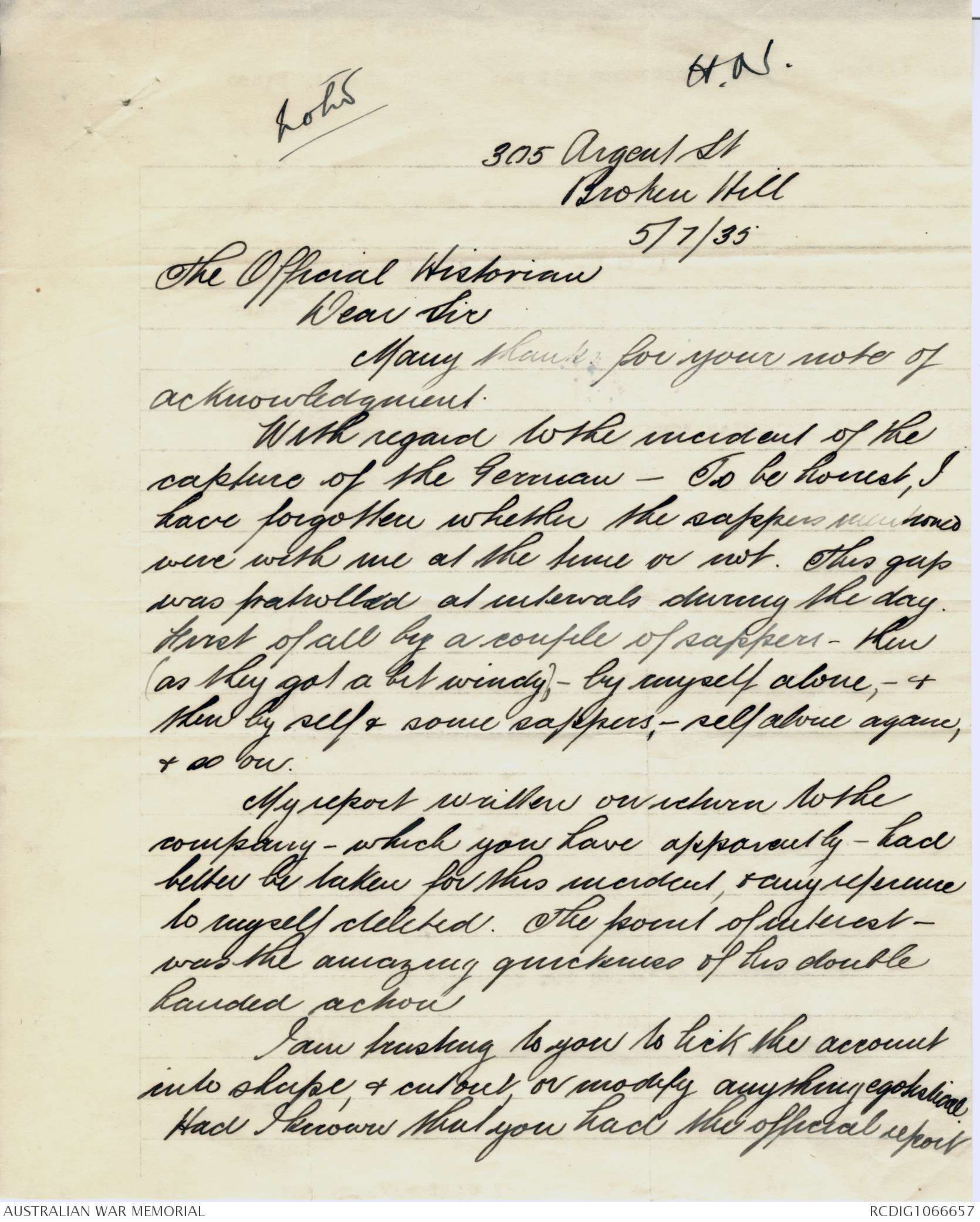
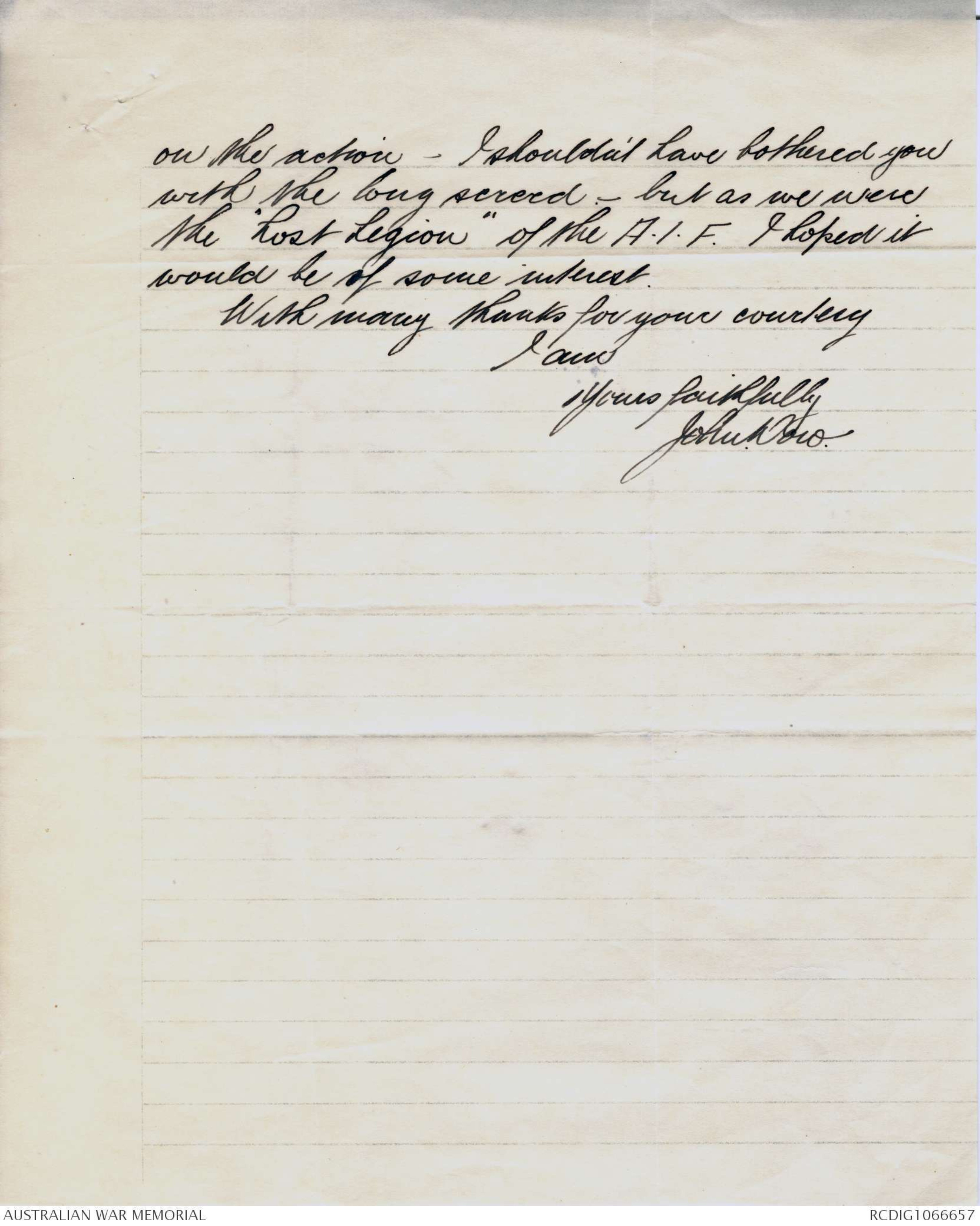
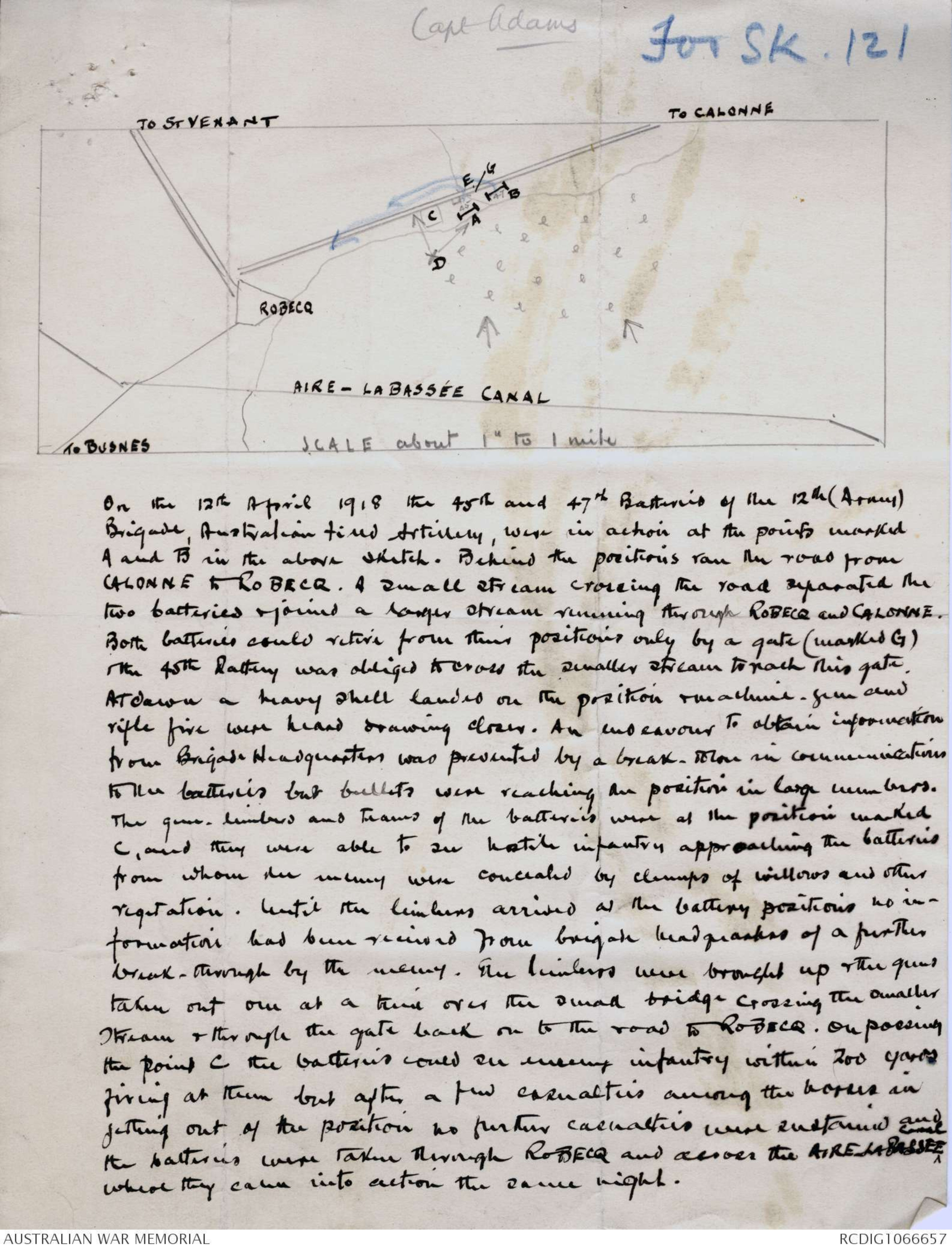
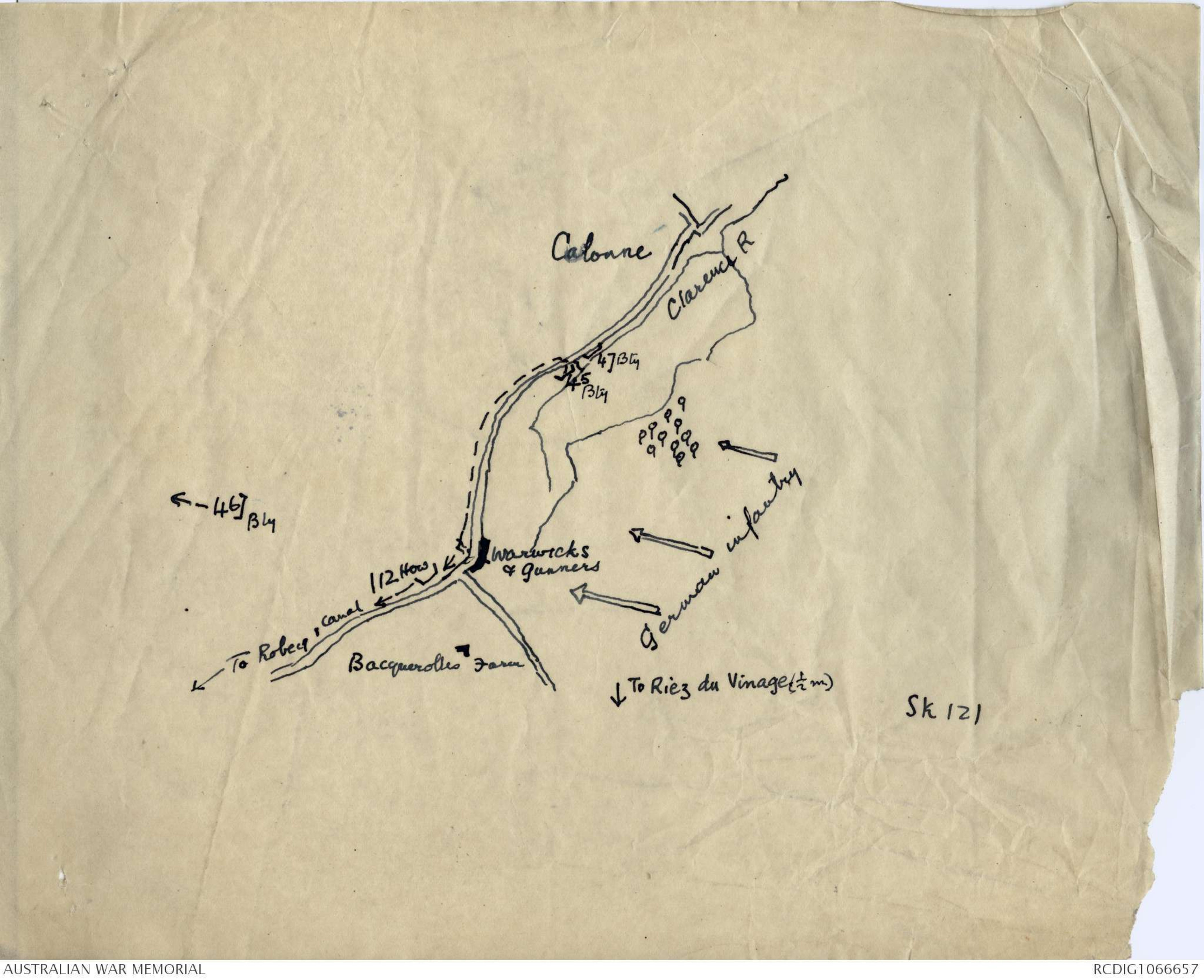
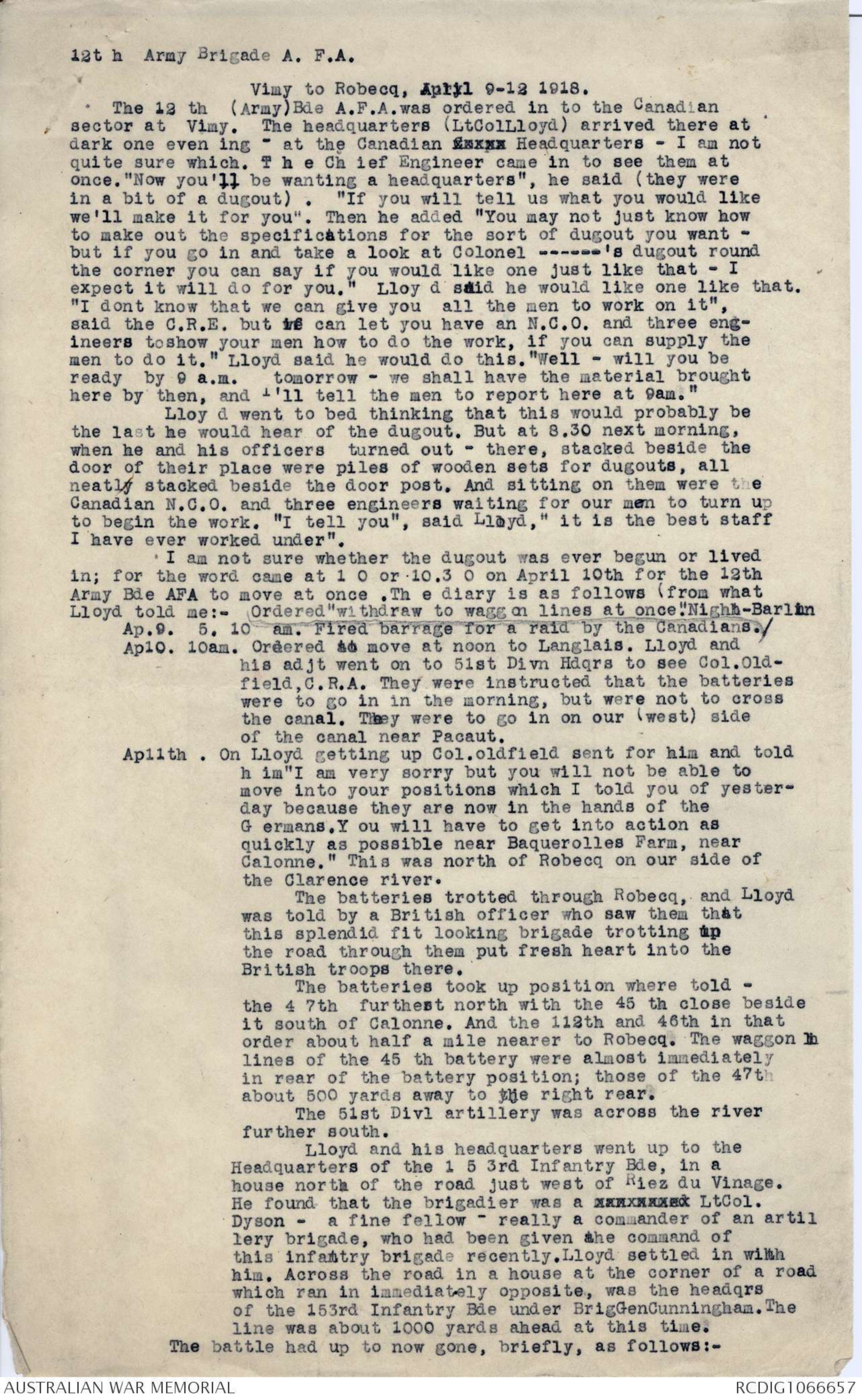
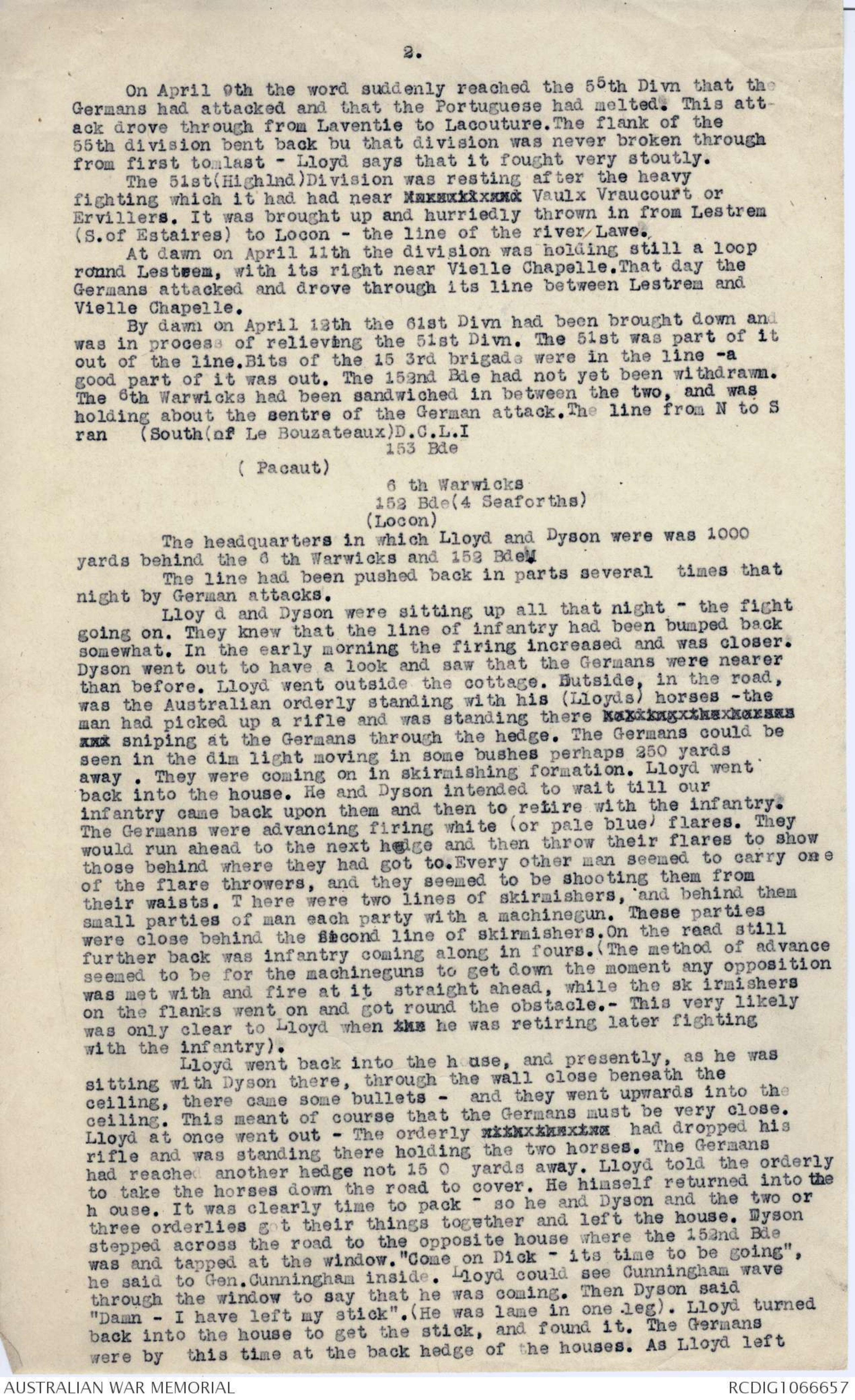

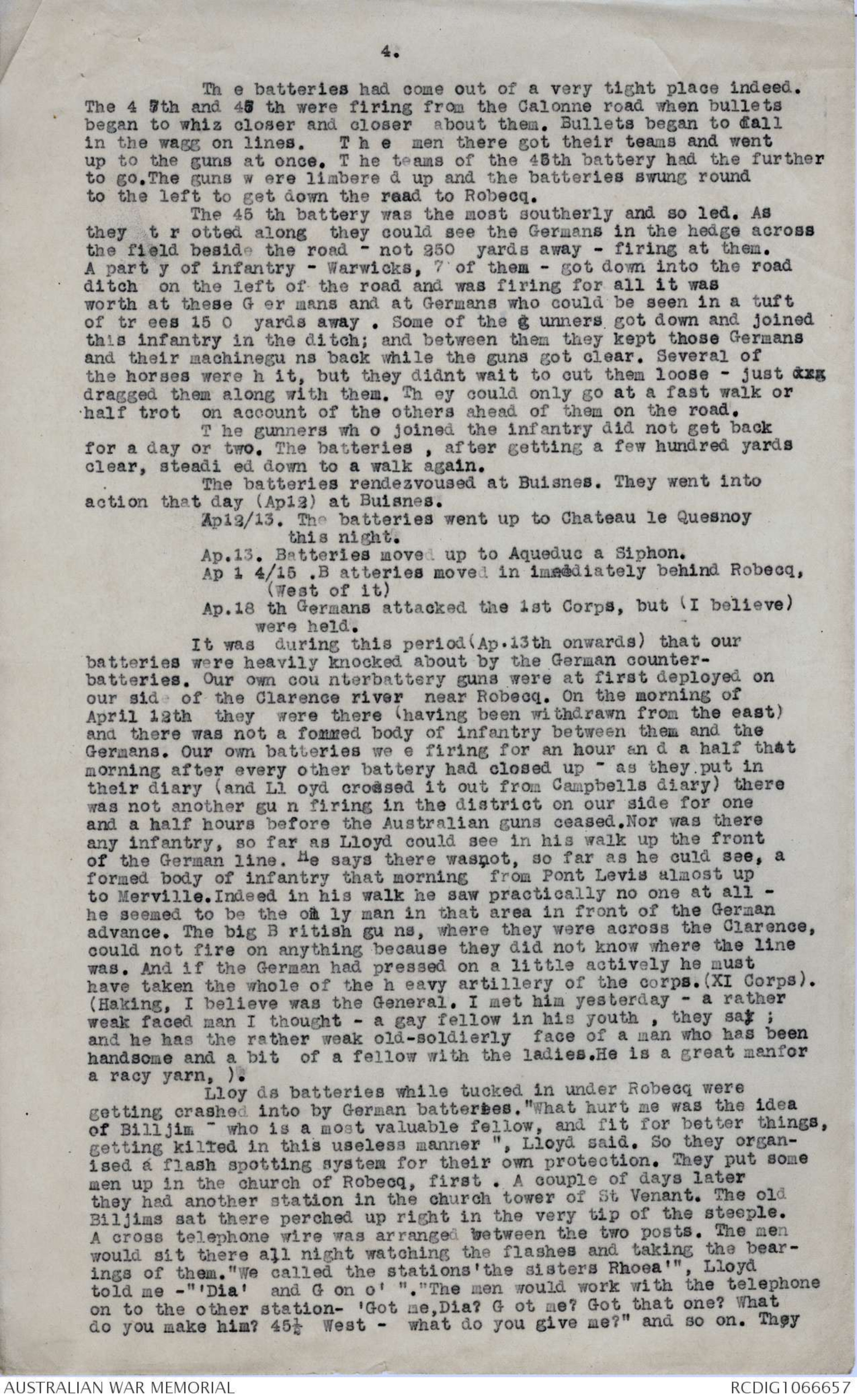
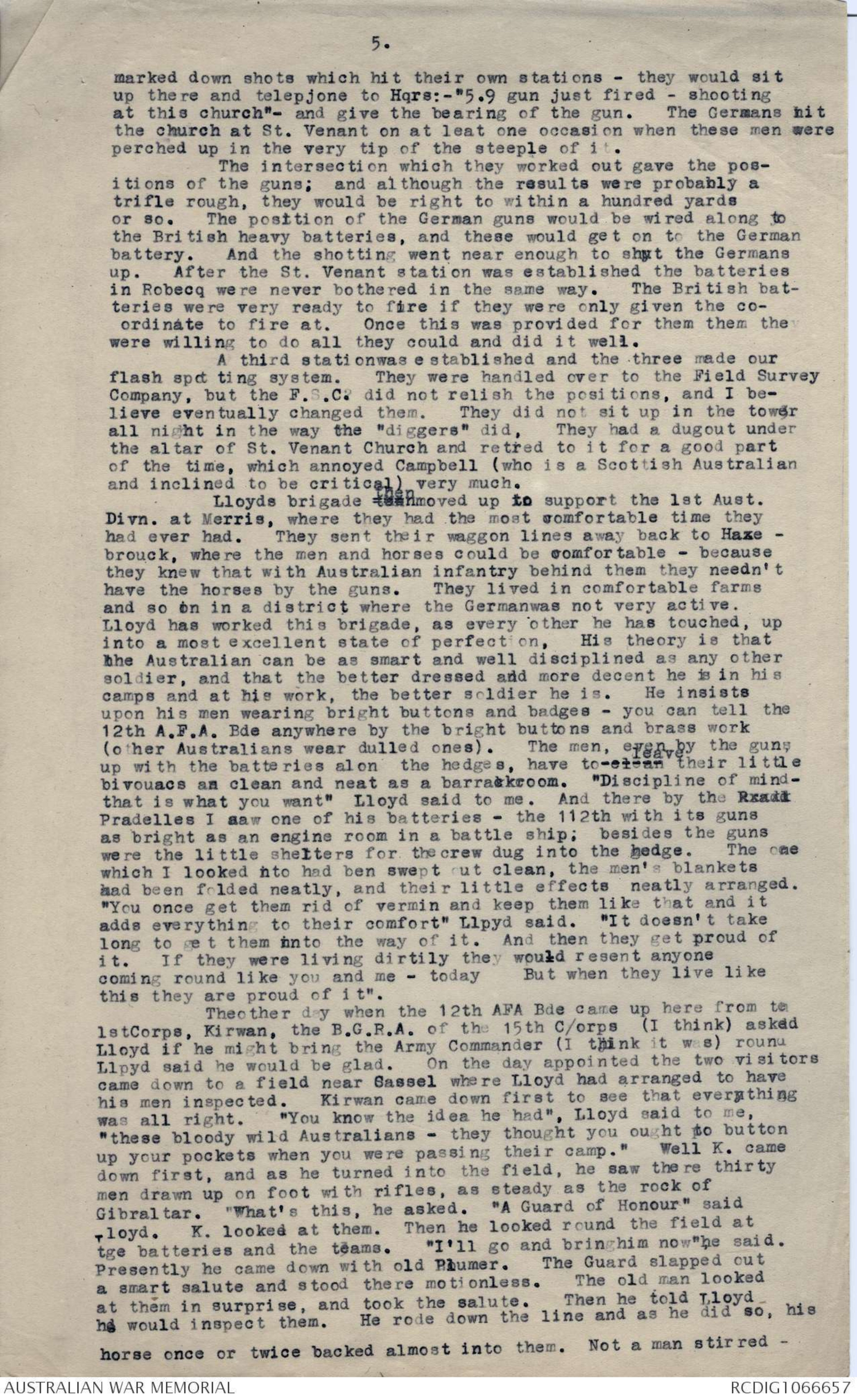
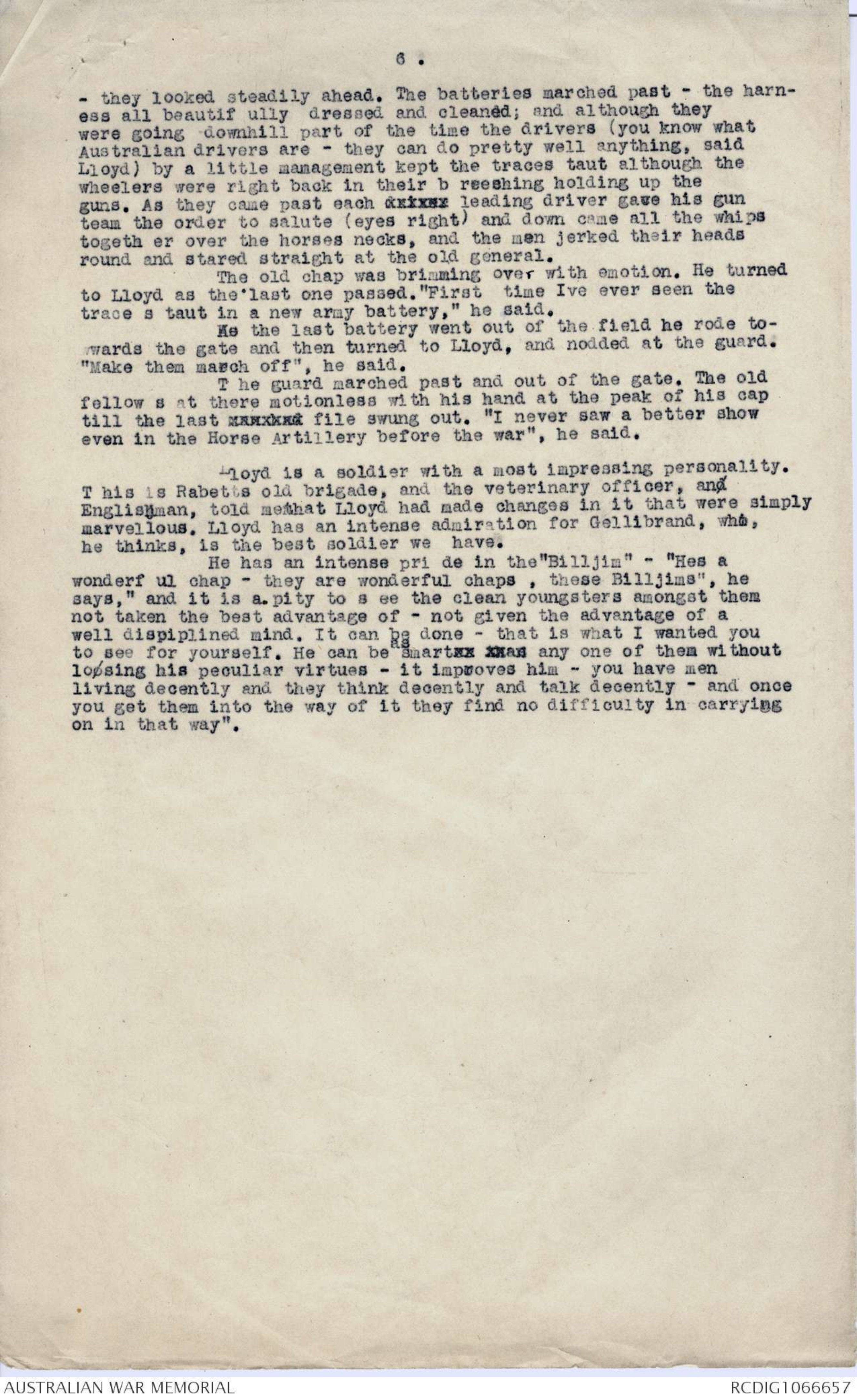
H.N.
305 Argent St
Broken Hill
5/7/33
The Official Historian
Dear Sir
Many thanks for your note of
acknowledgment.
With regard to the incident of the
capture of the German - To be honest, I
have forgotten whether the sappers mentioned
were with me at the time or not. This gap
was patrolled at intervals during the day.
First of all be a couple of sappers - then
(as they got a bit windy), - by myself alone, - &
then by self & some sappers, - self alive again,
& so on.
My report written on return to the
company - which you have apparently - had
better be taken for this incident, & any reference
to myself deleted. The point of interest-
was the amazing quickness of his double
handed action
I am trusting to you to lick the account
into shape, & cut out, or modify anything egotistical.
Had I known that you had the official report
on the action - I shouldn't have bothered you
with the long screed - but as we were
the "lost Legion" of the A.I.F. I hoped it
would be of some interest.
With many thanks for your courtesy
I am
Yours faithfully
John.Dow.
Capt Adams for SK. 121
TO St VEXANT TO CALONNE
Hand drawn diagram - see original document
ROBECQ
AIRE - LA BASSEE CANAL
TO BUSNES SCALE about 1" to 1 mile
On the 12th April 1918 the 25th and 47th Batteries of the 12th (Army)
Brigade, Australian field Artillery, were in action at the points marked
A and B in the above sketch. Behind the positions ran the road from
CALONNE to RO BECR. A small stream crossing the road separated the
two batteries & joined a larger stream running through RoBECQ and CALONNE.
Both batteries could retire from thus positions only by a gate (marked G)
the 45th Battery was obliged to cross the smaller stream to reach this gate.
AT dawn a heavy shell landed on the position & machine-gun and
rifle fire were heard drawing closer. An endeavour To obtain information
from Brigade Headquarters was prevented by a break-down in communications
to the batteries but bullets were reaching our position in large numbers.
The guns & limbers and trains of the batteries were at the position marked
C, and they were able to see hostile infantry approaching the batteries
from whom the enemy were concealed by clumps of willows and other
vegetation. Until the limbers arrived at the battery positions no information
had been received from brigade Headquarters of a further
break-through by the enemy. The limbers were brought up & the guns
taken out one at a time over the small bridge crossing the smaller
stream & through the gate back on to the road to ROBECQ. On passing
the point C the batteries could see enemy infantry within 200 yards
firing at them but after a few casualties among the horses in
getting out of the position no further casualties were sustained and
the batteries were taken RoBECQ and across the AIRES-LA BASSEE canal
where they came into action the same night.
CALONNE
Hand drawn diagram - see original document
12th Army Brigade A. F.A.
Vimy to Robecq, April 9-12 1918.
The 12 th (Army) Bde A.F.A.was ordered in to the Canadian
sector at Vimy. The headquarters (LtColLloyd) arrived there at
dark one even ing at the Canadian Corps Headquarters - I am not
quite sure which. T h e Ch ief Engineer came in to see them at
once. "Now you11 be wanting a headquarters", he said (they were
in a bit of a dugout) . "If you will tell us what you would like
we 11 make it for you". Then he added "You may not just know how
to make out the specifications for the sort of dugout you want -
but if you go in and take a look at Colonel ------'s dugout round
the corner you can say if you would like one just like that - I
expect it will do for you". Lloy d said he would like one like that.
"I don't know that we can give you all the men to work on it",
said the C.R.E. but if can let you have an N.C.O. and three engineers
toshow your men how to do the work, if you can supply the
men to do it." Lloyd said he would do this. "Well - will you be
ready by 9 a.m. tomorrow - we shall have the material brought
here by then, and I'll tell the men to report here at 9am."
Lloy d went to bed thinking that this would probably be
the last he would hear of the dugout. But at 8.30 next morning,
when he and his officers turned out - there, stacked beside the
door of their place were piles of wooden sets for dugouts, all
neatly stacked beside the door post. And sitting on them were the
Canadian N.C.O. and three engineers waiting for our men to turn up
to begin the work. "I tell you", said Lloyd, "it is the best staff
I have ever worked under".
I am not sure whether the dugout was ever begun or lived
in; for the word cane at 1 0 or 10.3 0 on April 10th for the 12th
Army Bde AFA to move at once. Th e diary is as follows (from what
Lloyd told me:- Ordered "withdraw to wagg on lines at once". Night-Barlin
Ap.9. 5. 10 am. Fired barrage for a raid by the Canadians.
Ap10. 10am. Ordered so to move at noon to Langlai. Lloyd and
his adjt went on to 51st Divn Hdqrs to see Col.Oldfiled,
C.R.A. They were instructed that the batteries
were to go in in the morning, but were not to cross
the canal. They were to go in on our (west) side
of the canal near Pacaut.
Ap11th On Lloyd getting up Col.oldfield sent for him and told
h im "I am very sorry but you will not be able to
move into your positions which 1 told you of yesterday
because they are now in the hands of the
G ermans.Y ou will have to get into action as
quickly as possible near Baquerolles Farm, near
Calonne." This was north of Robecq on our side of
the Clarence river.
The batteries trotted through Robecq, and Lloyd
was told by a British officer who saw them that
this splendid fit looking brigade trotting ap
the road through them put fresh heart into the
British troops there.
The batteries took up position where told
the 4 7th furthest north with the 45 th close beside
it south of Calonne. And the 112th and 46th in that
order about half a mile nearer to Robecq. The waggon in
lines of the 45 th battery were almost immediately
in rear of the battery position; those of the 47th
about 500 yards away to the right rear.
The 51st Divl artillery was across the river
further south.
Lloyd and his headquarters went up to the
Headquarters of the 1 5 3rd Infantry Bde, in a
house north of the road just west of Riez du Vinage.
He found that the brigadier was a named LtCol.
Dyson - a fine fellow - really a commander of an artillery
brigade, who had been given the command of
this infantry brigade recently . Lloyd settled in with
him. Across the road in a house at the corner of a road
which ran in immediately opposite, was the headqrs
of the 153rd Infantry Bde under BriggGnCunningham. The
line was about 1000 yards ahead at this time.
The battle had up to now gone, briefly, as follows:-
2.
On April 9th the word suddenly reached the 55th Divn that the
Germans had attacked and that the Portuguese had melted: This attack
drove through from Laventie to Lacouture. The flank of the
55th division bent back bu that division was never broken through
from first tomlast - Lloyd says that it fought very stoutly.
The 51st (Highlnd)Division was resting after the heavy
fighting which it had had near xxxxxxxxxx Vaulx Vraucourt or
Ervillers. It was brought up and hurriedly thrown in from Lestrem
(S. of Estaires) to Locon - the line of the river Lawe.
At dawn on April 12th the division was holding still a loop
round Lestrem, with its right near Vielle Chapelle. That day the
Germans attacked and drove through its line between Lestrem and
Vielle Chapelle.
By dawn on April 12th the 61st Divn had been brought down and
was in process of relieving the 51st Divn. The 51st was part of it
out of the line.Bits of the 15 3rd brigade were in the line -a
good part of it was out. The 152and Bde had not yet been withdrawn.
The 6th Warwicks had been sandwiched in between the two, and was
holding about the sentre of the German attack. The line from N to S
ran (South(of Le Bouzateaux)D.C.L.I
153 Bde
(Pacaut)
6 th Warwicks
152 Bde (4 Seaforths)
(Locon)
The headquarters in which Lloyd and Dyson were was 1000
yards behind the 6 th Warwicks and 152 Bde.
The line had been pushed back in parts several times that
night by German attacks.
Lloy d and Dyson were sitting up all that night - the fight
going on. They knew that the line of infantry had been bumped back
somewhat. In the early morning the firing increased and was closer.
Dyson went out to have a look and saw that the Germans were nearer
than before, Lloyd went outside the cottage. Butside, in the road
was the Australian orderly standing with his (Lloyds) horses -the
man had picked up a rifle and was standing there xxxxxxxxxand sniping at the Germans through the hedge. The Germans could be
seen in the dim light moving in some bushes perhaps 250 yards
away. They were coming on in skirmishing formation. Lloyd went
back into the house. He and Dyson intended to wait till our
infantry came back upon them and then to retire with the infantry.
The Germans were advancing firing white (or pale blue) flares. They
would run ahead to the next hedge and then throw their flares to show
those behind where they had got to.Every other man seemed to carry one
of the flare throwers, and they seemed to be shooting them from
their waists. T here were two lines of skirmishers, and behind them
small parties of man each party with a machinegun. These parties
were close behind the second line of skirmishers, On the road still
further back was infantry coning along in fours. (The method of advance
seemed to be for the machineguns to get down the moment any opposition
was met with and fire at it straight ahead, while the sk irmishers
on the flanks went on and got round the obstacle.- This very likely
was only clear to Lloyd when the he was retiring later fighting
with the Infantry).
Lloyd went back into the house, and presently, as he was
sitting with Dyson there, through the wall close beneath the
ceiling, there came some bullets - and they went upwards into the
ceiling. This meant of course that the Germans must be very close.
Lloyd at once went out - The orderly with the horses had dropped his
rifle and was standing there holding the two horses. The Germans
had reached another hedge not 15 0Yards away, Lloyd told the orderly
to take the horses down the road to cover. He himself returned into the
h ouse. It was clearly time to pack - so he and Dyson and the two or
three orderlies got their things together and left the house. Dyson
stepped across the road to the opposite house where the 152nd Bde
was and tapped at the window, "Come on Dick - its time to be going"
he said to Gen.Cunningham inside. Moyd could see Cunningham wave
through the window to say that he was coming. Then Dyson said
"Damn - I have left my stick", (He was lane in one leg). Lloyd turned
back into the house to get the stick, and found it. The Germans
were by this time at the back hedge of the houses. As Lloyd left
3.
the h ouse by the front door - while he was going through the door
he saw the Germans break in through the back door. Hn orderly and a
sergeant came outof the house at the same time[[?]] as Lloyd. They
stepped out into the road, and as they did so Lloyd saw, to the
left of him, lying down in the road, a German machinegunner. The
man had a light machinegun mounted on the road pointing down it
in their direction. The orderly who stepped into the road a few
seconds before Lloyd was hit and lay there looking piteously. The
sergeant who followed Lloyd was killed - Lloyd thinks. xxxxxxxx
Lloyds orderly with the two horses, riding one of them, at that
moment was riding up to Lloyd from the other direction. Lloyd
shouted to him to turn and get out of it. The machinegunner in the
road turned his gun onto the horses - firing low, and began firing
at them. He must have been flustered by the rate at which things
were happening, for he only hit one horse twice through the 1eg
without bringing it down, and they got away round the turn of the
road. Lloyd meanwhile had sli pped into the ditch under the hedge
in front of the house, and worked along it a few yards to the
corner of another road which ran in from the North just in rear of
his cottage. A party of Infantry was there - two or three men. Lloyd
took charge of them and helped to organise a sort of rearguard
action - falling back from time to time along the ditches and
hedges. T h ere were a fair number of Scotsmen scattered about
and th ey fought back with some of these, But many of the Scots
Lloy d noticed dinn did not turn up as time went on - and he has no
doubt that they were killed. Some of them would simply wait there
obstinately - almost sulkily - not firing - until the German cot
close enough "to kil 1 them by a shot. The German had won the upper
hand with his fire - he certain ly had superiority of fire, and
n oth ing st ood against h im/. Lloyd said that if only a
few posts had held out at interv als he is sure that the German
would not have come on. He was slow to come on - and for one thing
his own shrapnel kept him back. (I expect that if only isolated
resistance had been mad to him he would have concentrated his
guns and m.g s on those points and made it very not for them/. His
guns follow up very closely for that purpose.)
Dy son had gone before Lloyd saw him. As he waited
there by the opposit e house the Germans had come round it from the
back. There was a despatch rider starting his bicycle outside the
Headquarters of the 152 Bde. The b yke was difficult to start and
the despatchrider turne d round and asked a man who was just behind
h im to give him a shove off. T he man fired at him. It was a
Garman. The Despatchrider dropped that b icycle and ran across the
road to another, got o n it and went off clear down the road. Dyson
saw this as he was standing at the X roads by the house. He himself
h u rr ied down to the corner , turned round up the road to the
Nor th, and found that the Gar nans were already crossing it. So
he cut across the fields, ploughing along as best his old leg
could carry him - with the Germans sniping at him. They didnt hit
him either.
As Lloy d ret ired he passed the wood near Riez du Vinage,
where some batter ies of the 51st Divn were. There was noone seen
moving about the wood at this time - and the guns here were taken
by the Germans - two batteries of them. Lloyd thinks that they
should have been got away (of course he may not know the details).
Lloyd mad his way S.W towards the Canal, and struck it
about ti[[?]] bridges east of Pont Levis. He organised posts of Scots
at each of these bridgeheads - the infantry he saw were all or
nearly all scots, he says. He placed a post at the bridgehead two
from Pont Lev is; then at the f ootbridge E of Pont Levis. Then at
Pont Levis itself. By this time h e was very anxious about his own
batteries N or thward near Robecq. So he left the infantry posts
and headed round the front of the Germans, first N.E. and thenN
in the direction of Robecq. He could see the German shrapnel bursting
out ahead of their infantry, so he knew that the Germans had
not yet got into this angle, and the lights also gave him the
position of their fr ont. He simply walked round the lights as
you would walk round a fence, He reached the Robecq -Calonne road
and there, coming down it at a walk - he sat his own batteries.
They looked splendid and an immense load was taken off him.
4.
The batteries had come out of a very tight place indeed.
The 4 7th and 45 th were firing from the Calonne road when bullets
began to whiz closer and closer about then. Bullets began to fall
in the wagg on lines. T h e men there got their teams and went
up to the guns at once. T he teams of the 45th battery had the further
to go.The guns w ere limbere d up and the batteries swung round
to the left to get down the road to Robecq.
The 45 th battery was the most southerly and so led. As
they t r otted along they could see the Germans in the hedge across
the field beside the road - not 250 yards away - firing at then.
A part y of infantry - Warwicks, 7 of them - got down into the road
ditch on the left of the road and was firing for all it was
worth at these G er mans and at Germans who could be seen in a tuft
of tr ees 15 0 yards away. Some of the g unners, got down and joined
this infantry in the ditch; and between them they kept those Germans
and their machinegu ns back while the guns got clear. Several of
the horses were h it, but they didnt wait to cut them loose - just drg
dragged them along with them. Th ey could only go at a fast walk or
half trot on account of the others ahead of them on the road.
T he gunners wh o joined the infantry did not get back
for a day or two. The batteries , after getting a few hundred yards
clear, steadi ed down to a walk again.
The batteries rendezvoused at Buisnes. They went into
action that day (Api12) at Buisnes.
Ap12/13. The batteries went up to Chateau le Quesnoy
this night.
Ap.13. Batteries novel up to Aqueduc a Siphon.
Ap 1 4/16. B atteries moved in imeddiately behind Robecq,
(West of 1t)
Ap.18 th Gernans attacked the 1st Corps, but (I believe)
were held.
It was during this period (Ap.13th onwards) that our
batteries were heavily knocked about by the German counter-
batteries. Our own cou nterbattery guns were at first deployed on
our side of the Clarence river near Robecq. On the morning of
April 12th they were there (having been withdrawn from the east)
and there was not a formed body of infantry between them and the
Germans. Our own batteries we e firing for an hour an d a half that
morning after every other battery had closed up - as they put in
their diary (and Ll oyd crossed it out from Campbells diary) there
was not another gu n firing in the district on our side for one
and a half hours before the Australian guns ceased. Nor was there
any infantry, so far as Lloyd could see in his walk up the front
of the German line. He says there wasnot, so far as he culd see, a
formed body of infantry that morning from Pont Levis almost up
to Merville. Indeed in his walk he saw practically no one at all -
he seemed to be the on ly man in that area in front of the German
advance. The big B ritish gu ns, where they were across the Clarence
could not fire on anything because they did not know where the line
was. And if the German had pressed on a little actively he must
have taken the whole of the h eavy artillery of the corps. (XI Corps).
(Haking, I believe was the General. I net him yesterday - a rather
weak faced man 1 thought - a gay fellow in his youth, they say ;
and he has the rather weak old-soldierly face of a man who has been
handsome and a bit of a fellow with the ladies.He is a great manfor
a racy yarn, ).
Lloy ds batteries while tucked in under Robecq were
getting crashed into by German batteries, 'What hurt me was the idea
of Billjim - who is a most valuable fellow, and fit for better things
getting kilted in this useless manner ", Lloyd said. So they organised
a flash spotting system for their own protection. They put some
men up in the church of Robecq, first. A couple of days later
they had another station in the church tower of St Venant. The old
Biljims sat there perched up right in the very tip of the steeple.
A cross telephone wire was arranged between the two posts. The men
would sit there all night watching the flashes and taking the bearings
of them. We called the stations 'the sisters Rhoea’", Lloyd
told me - "Dia' and G on o' "."The men would work with the telephone
on to the other station- 'Got me, Dia? G ot me? Got that one? What
do you make him 45½ West - what do you give me?" and so on. They
5.
marked down shots which hit their own stations - they would sit
up there and telepjone to Hqrs:-"15.9 gun just fired - shooting
at this church"- and give the bearing of the gun. The Cermans hit
the church at St. Venant on at leat one occasion when these men were
perched up in the very tip of the steeple of it.
The intersection which they worked out gave the positions
of the guns; and although the results were probably a
trifle rough, they would be right to within a hundred yards
or so. The position of the German guns would be wired along to
the British heavy batteries, and these would get on to the German
battery. And the shotting went near enough to shut the Germans
up. After the St. Venant station was established the batteries
in Robecq were never bothered in the same way. The British batteries
were very ready to fare if they were only given the co-ordinate
to fire at. Once this was provided for them them they
were willing to do all they could and did it well.
A third stationwas e stablished and the three made our
flash spot ting system.They were handled over to the Field Survey
Company, but the F.S.C. did not relish the positions, and I believe
eventually changed them. They did not sit up in the tower
all night in the way the "diggers" did. They had a dugout under
the altar of St. Venant Church and retred to it for a good part
of the time, which annoyed Campbell (who is a Scottish Australian
and inclined to be critical) very much.
Lloyds brigade tenthentasknoved up to support the 1st Aust.
Divn. at Merris, where they had the most comfortable time they
had ever had. They sent the ir waggon lines away back to Hazebrouck,
where the men and horses could be comfortable - because
they knew that with Australian infantry behind them they needn’ t
have the horses by the guns. They lived in comfortable farms
and so on in a district where the Germanwas not very active.
Lloyd has worked this brigade, as every other he has touched, up
into a most excellent state of perfect on, His theory is that
the Australian can be as smart and well disciplined as any other
soldier, and that the better dressed and more decent he is in his
camps and at his work, the better soldier he is. He insists
upon his men wearing bright buttons and badges - you can tell the
12th A.F.A. Bde anywhere by the bright buttons and brass work
(other Australians wear dulled ones). The men, even by the guns
up with the batteries alon the hedges, have to clean leave their little
bivouacs as clean and neat as a barrackroom. "Discipline of mind-
that is what you want" Lloyd said to me. And there by the Pradd
Pradelles I saw one of his batteries - the 112th with its gune
as bright as an engine room in a battle ship; besides the guns
were the little shelters for. the crew dug into the hedge. The one
which I looked into had ben swept out clean, the men's blankets
had been folded neatly, and their little effects neatly arranged.
"You once get them rid of vermin and keep them like that and it
adds everything to their comfort" Llpyd said. "It doesn’t take
long to ge t them unto the way of it. And then they get proud of
it. If they were living dirtily they would resent anyone
coming round like you and me - today But when they live like
this they are proud of i t".
Theother day when the 12th AFA Bde came up here from te
1stCorps, Kirwan, the B.G.R.A. of the 15th C/orps (I think) askad
Lloyd if he might bring the Army Commander (1 think it was) round
Llpyd said he would be glad. On the day appointed the two visitors
came down to a field near Cassel where Lloyd had arranged to have
his men inspected. Kirwan came down first to see that everything
was all right. "You know the idea he had", Lloyd said to me,
"these bloody wild Australians - they thought you ought to button
up your pockets when you were passing their camp." Well K. came
down first, and as he turned into the field, he saw there thirty
men drawn up on foot with rifles, as steady as the rock of
Gibraltar. "What's this", he asked. "A Guard of Honour" said
Lloyd. K. looked at them. Then he looked round the field at
tge batteries and the teams. "I'll go and bring him now"he said.
Presently he came down with old Plumer. The Guard slapped out
a smart salute and stood there motionless. The old man looked
at them in surprise, and took the salute. Then he told Lloyd
he would inspect them. He rode down the line and as he did so, his
horse once or twice backed almost into them. Not a man stirred -
5.
- they looked steadily ahead. The batteries marched past - the harness
all beautif ully dressed and cleaned; and although the,
were going downhill part of the time the drivers (you know what
Australian drivers are - they can do pretty well anything, said
Lloyd) by a little management kept the traces taut although the
wheelers were right back in their b reeshing holding up the
guns. As they came past each driver leading driver gave his gun
team the order to salute (eyes right) and down came all the whips
togeth er over the horses necks, and the men jerked their heads
round and stared straight at the old general.
The old chap was brimming over with emotion. He turned
to Lloyd as the last one passed. "First time Ive ever seen the
traces taut in a new army battery," he said,
As the last battery went out of the field he rode towards
the gate and then turned to Lloyd, and nodded at the guard.
'Make them march off", he said.
T he guard marched past and out of the gate. The old
fellow s at there motionless with his hand at the peak of his cap
till the last Mounted file swing out. "I never saw a better show
even in the Horse Artillery before the war", he said.
Lloyd is a soldier with a most impressing personality.
T his is Rabetts old brigade, and the veterinary officer, and
Englishman, told methat Lloyd had made changes in it that were simply
marvellous, Lloyd has an intense admiration for Gellibrand, who,
he thinks, is the best soldier we have.
He has an intense pri de in the "Billjim" - "Hes a
wonderf ul chap - they are wonderful chaps , these Billjims", he
says, and it is a. pity to s ee the clean youngsters amongst them
not taken the best advantage of - not given the advantage of a
well dispiplined mind. It can be done - that is what I wanted you
to see for yourself. He can be as smater sxan any one of then without
1oosing his peculiar virtues - it improves him - you have men
living decently and they think decently and talk decently - and once
you get them into the way of it they find no difficulty in carrying
on in that way
 Sam scott
Sam scottThis transcription item is now locked to you for editing. To release the lock either Save your changes or Cancel.
This lock will be automatically released after 60 minutes of inactivity.